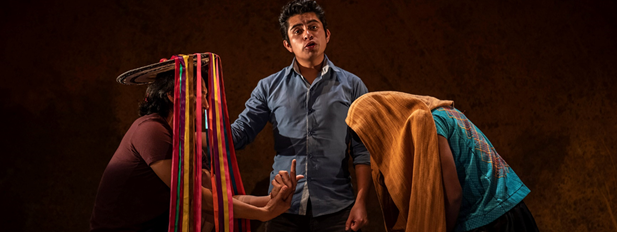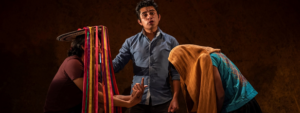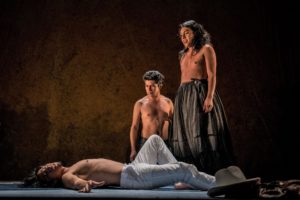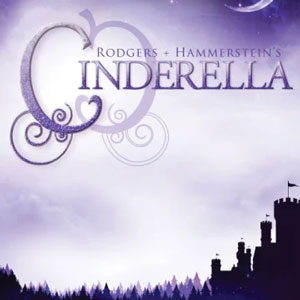
 Highly Recommended **** Powerful, unsettling, fantástico! “Andares” is an authentic tale of Mexico: its indigenous peoples, their distinct ancestry and cultures, and their modern-day lifestyle. Told entirely in Spanish with a nod to native languages, the show is replete with supertitles in English and is thus accessible to everyone.
Highly Recommended **** Powerful, unsettling, fantástico! “Andares” is an authentic tale of Mexico: its indigenous peoples, their distinct ancestry and cultures, and their modern-day lifestyle. Told entirely in Spanish with a nod to native languages, the show is replete with supertitles in English and is thus accessible to everyone.
After a year of exploring the multitude of customs and traditions within his homeland, Director Héctor Flores Komatsu wrote a captivating play focusing on the experiences of three youths, each a descendant of a different Indian/Mexican tribe: the Mayan, Zapotecan, and Wixarika. These are played by cast members Josué Maychi, Domingo Mijangos, and Lupe de la Cruz, who are convincing, inventive, and genuine. They open the show by placing authentic Mayan masks to their faces and then removing them to reveal a triste account combining daily life, myth, and politics. Bouncing around from narrative to stream-of-consciousness to legend, the larger story is told in spurts yet forms a comprehensive whole that elicits a roller-coaster ride of emotions among those in the audience.
Meaning walk or pathways in Spanish, “Andares” is a concatenation of real and apocryphal accounts of native peoples who are rich in culture but who have been robbed of their material and spiritual treasure across the generations. From the conquest of the Spanish invaders through the assaults of today’s corporate interests, it is the combination of greed and the quest for dominion and power that provide the framework for life’s bitterness throughout history. Yet life’s sweetness lies in the joyfulness, hopefulness, and frivolity imbedded in native fiestas and time-honored traditions, all resulting from the undying worship of the Great Spirit as personified in nature: as sacred animals like the stag and sacred trees like the kapok. From the names they remember as children to the teachings of their grandparents, each character calls forth bits of language and aspects of ancient traditions that persist as memories. Each of these things is holy, if only as a remembrance of a deceased ancestor, whose walk of life ought to be honored and respected. 
I enjoyed learning about the diversity of Mexico’s cultural heritage from this play; while at the same time, I found it sad and heart-wrenching to watch the continual exploitation of the indigenous people and the diminution of their past. That said, putting forth so many human-interest stories, mythic references, and Mayan terms in one production can be vastly overwhelming for the audience. If one is not already familiar with the culture and terminology, the result can be a blur. So as much as I loved the concept, the underlying structure, and the way everything was woven together, I couldn’t just sit back and enjoy what I was seeing. There was a lot of work involved in teasing out all the threads of the larger story, especially as they are not sequential and are often impressionistic. Plus, I constantly had to view the supertitles (as my first language is English and my knowledge of Spanish is rudimentary). The consequence was that this was a lot to absorb at once. This is not necessarily a fault with the production; rather, one has to see the show a second time to capture all its aspects and nuances—and reflect on it with the reverence it deserves.
The funniest segments occur on the rare occasion when the actors break out of character and suddenly shift from speaking in Spanish to English, especially when the projected English-language supertitles do not match what is being said on stage. A largely bilingual audience thoroughly enjoyed the disconnect, which revealed some deeper truths. That said, there are a few spots when the supertitles could have been a bit more accurate (especially in one scene), but I wouldn’t call that a flaw.
In addition to the playwright/director’s rousing promotion of native Mexican music, art, and theater, special recognition must be given to guitarist and singer, Raymundo Pavón Lozano. Without his robust and energetic performance, the production could not have held together. What a gorgeous demonstration of musical talent, playing his own original music! He was an absolute delight! He could bridge the gaps in the narrative simply by interrupting the action and pulling out his classical guitar. Arantxa Peláez Cházaro also deserves credit for his original lyrics for “Aguanieve.”
 The set is simple, and the costumes are fun. The few props work very well in spurring the imagination. For example, a large bamboo cane is used as a walking stick, a rifle, a blowgun dart, etc. A hat made of various hanging ribbons conveys both the festive and the feminine.
The set is simple, and the costumes are fun. The few props work very well in spurring the imagination. For example, a large bamboo cane is used as a walking stick, a rifle, a blowgun dart, etc. A hat made of various hanging ribbons conveys both the festive and the feminine.
An homage to the richness and diversity of Mexico, “Andares” illustrates the multiple pathways inherent in traditional culture. It is a production where despair is not an option, where living goes on regardless of hardship. It is this deep knowledge that the cycle of life will continue in one form or another that motivates and enervates all those who watch it. The show is thus a true work of art, and I can highly recommend it.
“Andares” is an 80-minute performance by the Makuyeika Colectivo Teatral company, playing Upstairs at the Chicago Shakespeare Theatre, at Navy Pier, 800 East Grand Avenue, Chicago, through October 27, 2019. The production is a part of Destinos, the third annual Chicago International Latino Theater Festival.
Performances are Wednesday through Saturday at 7:45 p.m. and Sunday at 2:30 p.m.
To purchase tickets, please contact the box office at 312-595-5600, or online at https://www.chicagoshakes.com/
To see what others are saying, visit www.theatreinchicago.com, go to Review Round-Up and click at “Andares”
There is a dedicated parking garage at Navy Pier for the Chicago Shakespeare Theatre, which is at Entrance 1, about halfway down the Pier. Enter through the doors and turn right. Parking tickets must be validated at the theater to receive the discounted rate.
The following bus routes access Navy Pier:
- #2 Hyde Park Express (Rush Hours, M-F)
- #29 State
- #65 Grand
- #66 Chicago
- #124 Navy Pier Express







More Stories
“Rodgers and Hammerstein’s Cinderella”
“Don’t Let The Pigeon Drive The Bus”
” The Hip Hop Nutcracker” reviewed by Amy Menzel